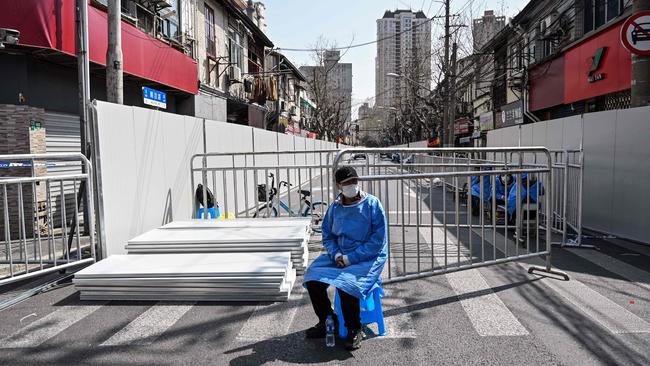Covid: Hit to Chinese GDP as Omicron sends 50 million into lockdown
Shenzhen — home of Chinese tech behemoths Huawei and Tencent — has been put into a week-long lockdown.

An Omicron wave has smashed China’s economy, put more than 50 million people into lockdown and threatened a health crisis in the largest elderly population in the world.
Shenzhen’s 17 million people – home of Chinese tech behemoths Huawei and Tencent – have been put into a week-long lockdown.
Flights to China’s financial capital, Shanghai, have also been diverted.
As well, temporary hospitals are being built in Jilin, a province of 24 million in China’s northeast, which has been put into the first provincial-wide lockdown since Hubei was closed in early 2020.
“The Covid situation in China has deteriorated at an alarming pace over the past week,” said Ting Lu, chief China economist at Nomura.
“We believe that China’s ‘around 5.5 per cent’ GDP growth target this year is becoming increasingly unrealistic.”
More than 3000 new daily cases were declared by China’s National Health Commission on Wednesday, a terrifying number for a population still following Beijing’s strict “zero Covid” policy.
Things are even grimmer in Hong Kong, which now has the highest Covid-19 death rate in the world.
Its morgues are at capacity and additional freezers have been sent to hospitals as the coronavirus devastates the region’s unvaccinated elderly population.
It has killed more than 4000 people in the past fortnight. More than 60 per cent of Hong Kong’s population over 80 years old was unvaccinated when the outbreak began in February.
China’s officials have warned that a more relaxed approach to the coronavirus would be catastrophic because of its elderly population and under-resourced healthcare system.
The number of under-vaccinated elderly people is a huge problem on the mainland, despite China being one of the world’s largest producers of vaccines.
In a widely shared essay on lessons China should learn from the Hong Kong outbreak, Zhang Wenhong, director of China’s National Centre for Infectious Diseases, urged people to get jabs.
“Those who have normal immunity and have received a booster dose of any vaccine were basically unharmed,” Dr Zhang said. “To control the virus, we must first eliminate the fear.”
More than 60 per cent of the 260 million Chinese over 60 years old – the largest elderly cohort in the world – have not had a booster jab, according to China’s Centre for Disease Control.
Almost 40 per cent of China’s population aged over 80 are entirely unvaccinated.
The current coronavirus outbreak has been made more dangerous by Beijing’s refusal to grant regulatory approval to the world’s most effective vaccines.
China’s vaccination drive has been mainly done with Sinovac and Sinopharm, jabs that have been replaced outside of China because of their reduced effectiveness against the Delta and Omicron strands.
Beijing has still not given approval to Germany’s BioNTech jab or any other mRNA vaccine as it encourages local medical companies to develop a Chinese version.
Yanzhong Huang, a senior fellow for global health at America’s Council on Foreign Relations, said China’s “zero Covid” strategy had left it vulnerable to major setbacks.
Mr Huang said Chinese state media’s exaggeration of the failure of pandemic policy in the rest of the world and boosterism about Beijing’s “zero Covid” approach made it harder for China to change its “increasingly unsustainable” strategy.
“As the pandemic becomes endemic and people learn to live with the virus in other countries, the immunity gap between China and the outside world will continue to expand,” he said.
China’s borders remain closed to the world except for selected travellers – a trickle of mostly business people – who must quarantine for three weeks.
Chinese citizens need to apply for permission to leave the country, with students studying overseas the most common group approved.




To join the conversation, please log in. Don't have an account? Register
Join the conversation, you are commenting as Logout